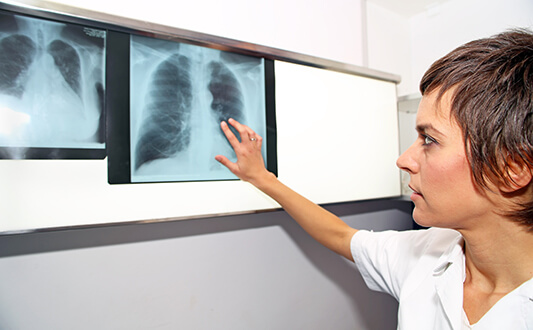Conventional treatment for pulmonary fibrosis offers limited hope, slowing progression but never reversing damage or restoring lung function. Now, breakthrough dendritic cell immunotherapy changes everything. This revolutionary approach doesn't just suppress symptoms; it trains your immune system to eliminate the specific cells causing lung scarring while protecting healthy tissue. Unlike traditional medications that require daily dosing with significant side effects, dendritic cell therapy involves a single personalized treatment that can halt fibrosis progression and actually improve breathing capacity. This innovative method represents a paradigm shift from damage control to genuine healing, offering new hope for patients with end-stage pulmonary fibrosis who previously faced limited options.
Understanding Pulmonary Fibrosis: The Challenge We Face
Pulmonary fibrosis represents one of medicine's most formidable challenges – a progressive lung disease where healthy tissue becomes replaced by thick, stiff scar tissue that makes breathing increasingly difficult. Unlike normal wound healing, pulmonary fibrosis creates a relentless cycle of lung damage that severely compromises quality of life.
The disease primarily affects adults over 50, with idiopathic pulmonary fibrosis (IPF) / idiopathic lung fibrosis being the most devastating form. Patients face a poor prognosis, with a median survival of just 2-5 years from diagnosis. What begins as a dry, persistent cough and mild shortness of breath rapidly progresses to debilitating symptoms that transform daily life.
The progressive impact on daily life includes:
- Simple activities like climbing stairs or walking become exhausting ordeals
- Conversations become difficult due to breathlessness
- Increasing dependence on supplemental oxygen therapy
- Loss of independence and ability to perform routine tasks
- Profound anxiety and depression affecting patients and families
As the disease advances, many patients face the prospect of a lung transplant as their only hope for extended survival. However, limited organ availability means most patients never receive this life-saving intervention. The economic burden compounds the suffering, with frequent hospitalizations, expensive oxygen equipment, and mounting medical bills creating additional stress during an already overwhelming time.
Currently affecting 13-20 cases per 100,000 people globally, pulmonary fibrosis rates continue rising as populations age, making innovative pulmonary fibrosis treatment guidelines an urgent medical priority.
Conventional Treatment Approaches
Despite decades of research, treatment options for pulmonary fibrosis remain severely limited. The FDA-approved medications represent significant progress but offer only modest benefits. Anti-fibrotic drugs can slow disease progression in some patients, potentially extending life by several months and reducing the frequency of acute exacerbations, but they cannot reverse existing lung damage or provide a cure.
The primary limitation of current therapies lies in their broad, non-specific approach. Corticosteroids and immunosuppressants attempt to reduce overall fibrotic activity but cannot precisely target the specific cells driving the disease process.
The fundamental problems with conventional approaches include:
- Failure to address the root cause: overactivated fibroblasts that continuously deposit scar tissue
- Inability to eliminate cells already producing excessive collagen
- No restoration of the lung's natural repair mechanisms
- Broad effects on both diseased and healthy tissue
- No solution for patients with advanced disease
By the time most patients receive the diagnosis, significant lung damage has already occurred. The current therapeutic paradigm essentially amounts to damage control rather than true healing, leaving patients and physicians with limited options as the disease progresses. This therapeutic gap has created urgent demand for innovative approaches that can specifically target disease-causing cells while preserving healthy lung tissue.
Dendritic Cell Therapy: A Revolutionary Approach
Dendritic cell therapy represents a new treatment for pulmonary fibrosis, moving from broad anti-inflammatory approaches to precision immunotherapy that specifically targets the cells driving disease progression. The Nobel Committee acknowledged the monumental impact of dendritic cells on modern medicine by awarding the 2011 Nobel Prize in Medicine to their discoverer, American immunologist Ralph Steinman.
Unlike conventional medications that broadly suppress fibrotic processes, dendritic cell therapy works by training the immune system to recognize and attack specific disease-causing cells. This targeted approach addresses the fundamental problem in pulmonary fibrosis: the persistence of cells that continuously deposit collagen and other scar tissue components.
The Science Behind Dendritic Cell Treatment
The scientific foundation of dendritic cell therapy lies in training the immune system to fight lung scarring. Dendritic cells act as the body's "immune teachers," showing T-cells which specific targets to attack. In this treatment of pulmonary fibrosis, dendritic cells are programmed to recognize diseased lung tissue, creating a personalized vaccine against each patient's fibrosis.
Scientists have discovered that certain proteins appear almost exclusively in scarred lung tissue while being virtually absent in healthy lungs. The most important targets are called ADAM12 and GLI1 proteins – these act like unique fingerprints that identify the problematic cells causing lung scarring.
The breakthrough came when researchers proved that vaccinating against these scar-specific proteins could dramatically reduce lung damage. Studies showed remarkable results: vaccination led to significant decreases in both the troublemaking cells and the amount of scar tissue in diseased lungs.
This pulmonary fibrosis latest treatment mechanism works through interconnected steps:
- Dendritic cells present fibrosis-associated antigens to the immune system
- Cytotoxic T-cells become specifically programmed to recognize diseased cells
- Activated T-cells migrate to the lungs and systematically eliminate overactivated fibroblasts
- Healthy tissue remains protected and unharmed
- Natural lung repair mechanisms are restored to normal function
Crucially, this approach appears to not only halt disease progression but also promote tissue regeneration. Research has shown that eliminating excess fibrotic tissue reduces the mechanical stiffness that impairs normal lung cell function. As the tissue environment normalizes, the lung's capacity for self-repair is restored, leading to improved cellular profiles and better oxygen exchange capacity.
The Treatment Process: What Patients Can Expect
Dendritic cell therapy follows a carefully structured protocol designed to maximize therapeutic benefit while ensuring patient safety. The process begins with a comprehensive evaluation at a specialized treatment center. Essential laboratory tests include complete blood count, liver and kidney function assessments, and other specialized tests as indicated by individual patient needs.
The most crucial step involves blood sampling for manufacturing the personalized dendritic cell vaccine. Approximately 50-100 ml of blood is collected from which the patient's own dendritic cells will be isolated and programmed. In some cases, if available, small tissue samples may also be utilized to enhance the specificity of the immune response. This entire initial phase is conducted on an outpatient basis, allowing patients to return home the same day.
Following blood collection, the patient's dendritic cells undergo sophisticated laboratory processing over 7-14 days. During this manufacturing period, the cells are isolated, cultured, and exposed to specific antigens associated with pulmonary fibrosis. This process, known as "loading," programs the dendritic cells to recognize and present fibrosis-associated proteins to the immune system. Each vaccine is individually prepared for the specific patient, ensuring optimal compatibility and effectiveness.
The treatment administration involves:
- Outpatient procedure at a specialized medical center
- The dendritic cell vaccine subcutaneous injection
- Post-treatment monitoring for immediate reactions
- Symptom management and support as needed
- Professional nursing care throughout the process
The entire treatment administration is completed in a single day on an outpatient basis. Patients typically experience minimal discomfort and can return to normal activities within 24-48 hours. Follow-up appointments are scheduled based on individual patient needs and treatment response.
Clinical Evidence and Results
Research findings demonstrate promising outcomes for dendritic cell vaccination in lung fibrosis treatment. Clinical trials targeting scar-specific proteins have shown remarkable results, with treatments reducing lung scarring by 60-80% in research models.
The breakthrough came from proving that the immune system could successfully eliminate the cells causing lung damage while leaving healthy tissue completely untouched. This precise approach not only stopped disease progression but also restored the lung's natural ability to heal itself.
Patients in studies experienced enhanced survival rates, better weight maintenance during treatment, and improved ability to handle daily activities. Lung function showed measurable improvements, including decreased tissue stiffness and better oxygen exchange. Most encouraging, these benefits lasted for months after treatment of idiopathic pulmonary fibrosis, suggesting lasting protection.
Key improvements patients experienced include:
- Substantial improvements in breathing capacity
- Reduced cough severity and frequency
- Enhanced ability to perform daily activities
- Improved exercise tolerance
- Better overall quality of life scores
- Reduced need for supplemental oxygen in some patients
The safety profile is encouraging, with no significant organ damage observed and minimal impact on the body's normal healing processes. Treatment appears most effective when given before extensive scarring of lungs develops, emphasizing the importance of early intervention. This gives hope to patients who previously faced limited options, offering a potential path toward not just slowing their disease but actually improving their lung function.
Integrated Treatment Strategies
New pulmonary fibrosis treatment involves combining dendritic cell therapy with existing medications to create more powerful, personalized IPF treatment plans. This integrated approach maximizes benefits while reducing risks by attacking the disease from multiple angles simultaneously.
Combining dendritic cell therapy with current anti-fibrotic drugs offers significant advantages. While conventional medications slow down scarring throughout the lungs, immunotherapy precisely targets and eliminates the specific cells causing the damage. This dual strategy addresses both the symptoms patients feel and the root cause of their disease.
The best treatment for pulmonary fibrosis varies in timing and combination for each patient. Some benefit from receiving both therapies together, while others do better with treatments given in sequence. Your medical team carefully considers your specific situation to create the most effective plan:
- Disease severity and progression rate
- Patient age and overall health status
- Previous treatment responses and tolerability
- Comorbid conditions affecting treatment choices
- Patient preferences and lifestyle factors
The care team includes pulmonologists, immunotherapy specialists, respiratory therapists, and support staff working together to address every aspect of the condition. This comprehensive approach recognizes that pulmonary fibrosis affects a patient’s entire life, not just lungs, ensuring attention to physical health, emotional well-being, and quality of life throughout the idiopathic pulmonary fibrosis treatment journey.
| Characteristic | Standard Treatment | Standard Treatment + Dendritic Cell Vaccine |
|---|---|---|
| Treatment Mechanism | Broad anti-fibrotic suppression | Targeted elimination of disease-causing cells |
| Treatment Approach | One-size-fits-all protocol | Personalized immunotherapy |
| Disease Progression | Slows progression moderately | Halts progression and promotes tissue repair |
| Treatment Duration | Continuous daily medication | Single outpatient procedure + follow-up |
| Side Effects | Significant GI, liver, and skin reactions | Minimal, temporary immune responses |
| Oxygen Dependency | Often increases over time | May reduce or eliminate the need |
| Life expectancy | Extends life by several months | Potential for significant life extension |
*Data from Booking Health clinical analysis. Treatment outcomes may vary based on individual patient factors, disease severity, and timing of intervention. Consult with our lung specialists for personalized treatment planning and comprehensive care coordination.
Patient Success Story: Francis's Journey from Breathlessness to Recovery
Francis Bekele's journey from Ghana demonstrates how the latest treatment for pulmonary fibrosis can transform lives when conventional approaches fall short. At 43, this mining company worker from Accra faced a deteriorating condition that threatened not only his livelihood but his basic ability to breathe.
Living near mining operations, Francis developed pulmonary fibrosis complicated by pneumothorax in 2018. The dusty environment of his workplace contributed to his worsening respiratory condition. Despite treatment with steroids and antibiotics in Ghana, Francis continued experiencing severe breathlessness, chronic cough, chest pains, and overwhelming fatigue that made even short walks impossible.
"Before treatment, I was always having shortness of breath with a little walk. Sometimes they had to put oxygen on me," Francis recalls. He was hospitalized multiple times at Agogo Presbyterian Hospital over two years, with his condition showing no improvement despite conventional treatments. "It happened about 5 or 6 times whilst I was in Ghana. It was so hard for me working, doing anything. With the little things that I would try to do, I feel tired so soon."
The turning point came when a friend from the UK, familiar with advanced medical options abroad, connected Francis with a specialized company in Germany. Through careful coordination, Francis received dendritic cell therapy – an innovative treatment that targets the underlying immune dysfunction in fibrosis of lung.
The transformation has been remarkable. "Now I can say almost 80 to 90% healed," Francis shares. "I can breathe, I can walk distances that I don't feel that kind of shortness of breath. I can do certain things I was not able to do before. Even yesterday I went to work and did everything I was supposed to do."
Francis's experience highlights how dendritic cell therapy offers genuine hope for patients with limited conventional treatment options. His journey from debilitating breathlessness to returning to work demonstrates the life-changing potential of this innovative approach to pulmonary fibrosis treatment.
"There is hope for everything you are going through," Francis advises other patients facing similar challenges, emphasizing how proper medical coordination from Booking Health made his international treatment journey possible and successful.
Looking Forward: Hope and Realistic Expectations
A diagnosis of pulmonary fibrosis, especially in advanced stages, can feel devastating. There may be moments when it seems like "this is the end," and even specialists may indicate that "treatment options are limited" or "we can only slow the progression." However, there is always hope, even when conventional medicine appears to offer little relief.
Respiratory medicine is advancing rapidly, with breakthrough innovations emerging constantly. Dendritic cell immunotherapy, advances in stem cells in medicine, combined treatment protocols, and personalized therapeutic approaches are being developed to preserve and restore lung function. While standard antifibrotic therapy benefits many patients, pulmonary fibrosis often becomes resistant to conventional approaches over time.
Dendritic cell therapy and other cutting-edge interventions represent genuine hope for patients with severe or advanced disease. Unlike lengthy hospitalizations, dendritic cell vaccination requires only outpatient visits. With fewer side effects than standard approaches, this method demonstrates that treatment for idiopathic pulmonary fibrosis can be both effective and life-transforming.
At Booking Health, we understand that each patient's journey is unique. Our specialists combine pulmonologist expertise with immunotherapy consultation to create personalized treatment plans. Even for the most challenging cases, there is a path forward – and we're here to guide you through it.
Your Trusted Partner: Every Step of the Way With Booking Health
Finding the best treatment strategy for your clinical situation is a challenging task. Being already exhausted from multiple treatment sessions, having consulted numerous specialists, and having tried various therapeutic interventions, you may be lost in all the information given by the doctors. In such a situation, it is easy to choose a first-hand option or to follow standardized therapeutic protocols with a long list of adverse effects instead of selecting highly-specialized innovative treatment options.
To make an informed choice and get a personalized treatment plan, which will be tailored to your specific clinical situation, consult medical experts at Booking Health. Being at the forefront of offering the latest medical innovations for 12 years, Booking Health possesses solid expertise in creating complex therapeutic programs in each case. As a reputable company, Booking Health offers personalized pulmonary fibrosis treatment plans with direct clinic booking and full support at every stage, from organizational processes to assistance during treatment. We provide:
- Assessment and analysis of medical reports
- Development of the medical care program
- Selection of a suitable treatment location
- Preparation of medical documents and forwarding to a suitable clinic
- Preparatory consultations with clinicians for the development of medical care programs
- Expert advice during the hospital stay
- Follow-up care after the patient returns to their native country after completing the medical care program
- Taking care of formalities as part of the preparation for the medical care program
- Coordination and organization of the patient's stay in a foreign country
- Assistance with visas and tickets
- A personal coordinator and interpreter with 24/7 support
- Transparent budgeting with no hidden costs
Health is an invaluable aspect of our lives. Delegating management of something so fragile yet precious should be done only to experts with proven experience and a reputation. Booking Health is a trustworthy partner who assists you in pursuing stronger health and a better quality of life. Contact our medical consultant to learn more about the possibilities of personalized treatment with innovative methods for pulmonary fibrosis with leading specialists in this field.
FAQ About Pulmonary Fibrosis Answered
Send request for treatmentPulmonary fibrosis is a progressive lung disease where healthy tissue becomes replaced by thick scar tissue, making breathing difficult. Causes include environmental toxins, certain medications, autoimmune diseases, and genetic factors. In many cases, the cause remains unknown.
Common symptoms include persistent dry cough, shortness of breath during activity, fatigue, chest discomfort, and gradual weight loss. Symptoms worsen over time as lung function declines and oxygen levels drop.
Currently, there is no cure for pulmonary fibrosis. However, innovative treatments like dendritic cell therapy and stem cell treatments can halt progression and improve lung function, offering hope beyond conventional damage control approaches.
Treatment options include antifibrotic medications, oxygen concentrator therapy, pulmonary rehabilitation, and innovative approaches like dendritic cell immunotherapy. Treatment plans are personalized based on disease severity and patient needs.
Idiopathic pulmonary fibrosis (IPF) is a form of interstitial lung disease with an unknown cause and typically worse prognosis. Other types have identifiable causes like occupational exposures, medications, or autoimmune conditions.
Lung transplant is considered for patients under 65 with advanced disease who remain healthy enough for surgery. Limited organ availability means most patients never receive transplants, making innovative treatments crucial.
Yes, oxygen therapy helps maintain adequate oxygen saturation levels, reducing strain on the heart and improving quality of life. Many patients use portable oxygen during activities or continuous oxygen as the disease progresses.
Progression varies significantly between patients. Some experience rapid decline within months, while others have slower progression over years. Regular monitoring helps track changes and adjust treatment plans accordingly.
Life expectancy varies widely depending on disease type and severity. IPF typically has 2-5 year median survival from diagnosis, but innovative treatments may significantly extend survival and improve quality of life.
Traditional treatments cannot achieve remission, but breakthrough therapies like dendritic cell immunotherapy have shown potential to halt progression and restore lung function, offering possibilities previously unavailable.
Yes, innovative treatments, including dendritic cell therapy and stem cells, are available. Support groups and specialized centers can provide information about accessing these breakthrough treatment options.
Spirometry and pulmonary function tests are typically performed every 3-6 months to monitor disease progression. HRCT scans may be done annually or when symptoms change significantly to assess lung tissue changes.
While pulmonary fibrosis is serious and progressive, innovative treatments are changing outcomes. Pulmonary rehabilitation and respiratory therapy combined with breakthrough immunotherapies offer hope for extended survival and improved quality of life.
Choose treatment abroad and you will for sure get the best results!
Authors:
This article was edited by medical experts, board-certified doctors Dr. Nadezhda Ivanisova, and Dr. Vadim Zhiliuk. For the treatment of the conditions referred to in the article, you must consult a doctor; the information in the article is not intended for self-medication!
Our editorial policy, which details our commitment to accuracy and transparency, is available here. Click this link to review our policies.
Sources:
Read:
Pulmonary sarcoidosis therapy: combining drugs with non-drug treatment options
Не знаете, с чего начать?
Свяжитесь с Booking Health






